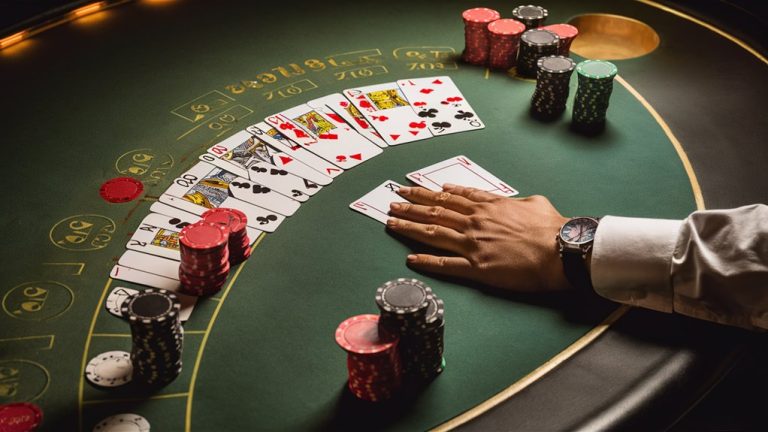
How to Play Poker Like a Pro: Key Strategy Guide

Main Areas for Skill Mastery
Learning poker basics needs strong know-how in five key areas that show the gap between pros and new players. Let’s dig into the deep plan to up your game. 이 자료 참고하기
Math Skills and Analyzing Hands
Hand ranks and their math chances are the roots of pro poker. Good players quick count pot odds and use math to make choices fast, beating those who play on feeling.
Deep Play Psychology
Knowing player signals through careful study of others is key while keeping your own strong image at the table. Pros watch how others bet and track their physical hints to win with mind games.
Smart Money Management
Tight money control includes smart buy-in choices and tight risk rules. Top players guard their cash by choosing the right games and betting levels that match their total money.
Mental Game Strength
Building a strong mental game helps you stay good under stress. Pros keep their head in long games, handle tough times well, and use place power all through the game.
Playing Smart Positions
Smart place moves let pros earn more in good spots and lose less in bad ones. Knowing place-based play lifts win rates at all levels. Delving Deep to Uncover Micro-Opportunities
Basic Poker Hand Orders
Full Guide to Poker Hand Ranks: Know the Order
Get to Know Poker Hand Strength
Poker hand ranks are key for good play in all big games, like Texas Hold’em and Omaha.
Getting these ranks down is a must to make top table moves.
Normal Poker Hand Orders (Best to Worst)
1. Royal Flush
The top poker hand, with Ace, King, Queen, Jack, and Ten all in the same suit. No hand beats this.
2. Straight Flush
Five cards in a row, all in the same suit. For instance, 7-8-9-10-Jack of hearts shows this strong hand.
3. Four of a Kind
Four cards of the same type, plus any fifth card. Like: four Queens with one more card.
4. Full House
Three cards of one type and one pair. Like: three Sevens and two Kings.
5. Flush
Five cards, same suit, any order. Like: any five hearts.
6. Straight
Five cards in order, mixed suits. Like: 6-7-8-9-10 from different suits.
7. Three of a Kind
Three cards with the same value. Like: three Jacks with two more cards.
8. Two Pair
Two different pairs and any fifth card. Like: two Queens, two Fives, and one more card.
9. One Pair
One pair and three other cards. Like: two Kings with three random cards.
10. High Card
When no pairs, the top single card plays.
Using Hand Chances
Knowing hand odds makes a big mark on betting choices and overall plans.
Rarer hands are worth more, needing smart thoughts in play.
This odds-based way lets players go with strong math moves when under stress.
Seeing Your Foes’ Hints
Watching Your Foes’ Signs in Poker: A Full Guide

Spotting Signs at the Poker Table
Reading poker signs is more than knowing hands and math. Reading Crimson Cues in Dealer Expressions
The skill to see body and act signs can really lift win rates and give key edges in play.
Keys for Spotting Tells
Bet Pattern Checks
Smart timing and changing bet sizes show much about hand power. Look for big changes in normal bet ways, especially when big money is in play.
Weird bet ways often show true bold moves or bluffs.
Body Hints
Chip Moves and card handling tell a lot about what players think. Watch how they handle their chips and cards when the heat is on.
Hand moves and chip stacks often match with hand power or unsure plans.
Upper Body Signs
Watch body reactions like neck tightness, breath speed, and eye moves. These unplanned acts often spill true bold levels.
Keep an eye on face small moves and body shifts at key choice times.
Smart Tell Use
Top tell reading mixes many behavior clues. Look for grouped behavior shifts that stray from usual acts. When a bold player stops to think, showing odd body acts, these mixed tells often hint at big hand power shifts.
Think of these signs in the wider play patterns and table ways. Always watching behavior with smart watching builds deep insights for smart choices at the poker table.
Pot Odds and Math
Knowing Poker Pot Odds and Math Plan
The Math Side in Poker
Getting the math roots of poker gives a strong choice base, past mind games and hints.
Pot odds counting is key for money-making choices, letting players go with smart math at the table.
Figuring Pot Odds
Pot odds are the call cost rate against the full pot size. The idea is dividing the call sum by the full pot after your call.
For instance:
- Today’s pot: $100
- Call sum: $25
- Full pot after call: $125
- Pot odds rate: 25:125 (made simple to 1:5)
Equity and Choices
Match your pot odds to your hand chances – the odds of making the top hand.
When chances are higher than pot odds, math backs the call. This main rule leads to money-making choices in poker cases.
Deep Ideas: Future Odds
Future odds build on basic pot odds by adding possible future wins.
With hands like flush draws or straight draws, think of both fast pot odds and likely future street gains. This broad math way is the heart of deep poker plans.
Key Math Parts:
- Basic pot odds figuring
- Hand chance checks
- Future odds weighing
- Next street thoughts
- Drawing hand math





